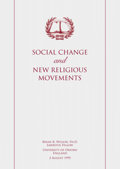A variety of diverse concerns appear to have stimulated opposition to Scientology, including those usually aroused in relation to new religions in general.
First, Scientology may arouse suspicion because it claims to derive spiritual insights from the application of rational procedures. Those committed to traditional religion generally regard religious values as altogether transcending the realm of the rational, and may be affronted by the idea that religious truths or spiritual benefits can be realized by technical means—means others than their own hallowed conceptions of worship and morality. Rational procedures and systematic learning characterize science, technology, and economics rather than the quest for ancient religious truth or spiritual experience. Because Scientology conjoins spiritual goals and rational, technical (and indeed technological) means, those committed to established religion tend to condemn it as not “real” religion. They regard it as spurious because it utilizes modern knowledge rather than ancient formulae, minimizes or relinquishes such usual religious concepts as sacrality and ritual, and adopts a pragmatic orientation to the pursuit of religious goals. Ignoring the extent to which religious giving and endowment are necessary to all religious organizations, they also see that in Scientology, adherents are required to pay towards the cost of their instruction as too commercial and business-like, too directly a matter of payment for services, to be appropriate for a religion. Hence, the economic arrangements of Scientology are represented as exploitative and therefore disqualifying that movement as a religion. However, those advancing such strictures fail to recognize that in established churches imperative financial demands are inevitably made on adherents, as in the payment for a mass in the Catholic Church, in the instituted covenants of some Protestant denominations, or in tithes exacted, in the past, by the major churches, and still required in numerous Christian sects. These financial levies appear to be of a different kind only because the payment procedures are sanctified by often ancient custom or sanctioned by Biblical warrant. Critics of the economic arrangements of the Church of Scientology ignore the fundamental functional similarity of the economic procedures of traditional religions simply because the form differs and in virtue of the antiquity and sanctity in which they are usually clothed.
Second, Scientology promises therapeutic benefit in releasing individuals from the effect of past traumatic experiences. That promise may appear to conventional practitioners of psychiatric medicine to be a challenge both to the theoretical assumptions of their practice and, more especially, to the techniques they employ. Thus, two groups of professionals, clerics and psychiatrists, who may be said to have vested interests in these matters, are likely to stimulate opposition to Scientology, and each has a wider constituency of fellow professionals (teachers and physicians for example) and of a still wider lay public whom they can influence.
Third, some of those who take up Scientology decide to undergo further training to become qualified Scientology auditors, abandoning more conventional career opportunities. Parents, relatives, and friends uninitiated in Scientology may view such a decision with alarm. If estrangement from family and friends follows such a religious choice, as has sometimes been the case, this provides further ammunition for those who oppose this new religion—it becomes, in their eyes “a cult which breaks up families”.
The Church of Scientology, in contrast, maintains that spiritual benefits may be realised in present life. It contends that all individuals are inherently good, and teaches that everyone should take responsibility for his own life and activities.
Fourth, a more general and diffuse aspect of the cultural ethic of Scientology may stimulate further opposition. Traditional Christianity inherits a broadly ascetic orientation to the world, and has cultivated, well beyond the confines of the churches or their congregations, assumptions about the essential character of true religion, namely that religion should be solemn, fostering an ascetic ethic, and committed to the sacrifice of this‑worldly comforts in the interest of preparing for reward in an afterlife. Its preoccupation has been to imbue man with a sense of his inherent sinfulness and his inability by his own efforts to attain salvation. Instead, people were enjoined to depend only on a saviour—god. The Church of Scientology, in contrast, maintains that spiritual benefits may be realised in present life. It contends that all individuals are inherently good, and teaches that everyone should take responsibility for his own life and activities. For the churches, a religion which rejects the inherent sinfulness of mankind is already an affront, but this challenge is not lessened by the fact that the ethic which Scientology embraces has much closer affinity with the ethos prevailing in the secular Western world of the late 20th century, an ethos of permissive hedonism, emphasizing human happiness and encouragement for people to realize their full potential. Even many non‑religious people, who accept a secular hedonistic orientation to the world, are unready to acknowledge as religion a doctrine which abandons the solemn condemnation of all mankind as sinners, and, little as they may consciously accept the traditional Christian position, nonetheless oppose a religion which in these fundamental matters differs from it. Thus, because some are not yet ready to relinquish the traditional world view, and because others believe that, although they do not endorse that ethic themselves, nevertheless, it is business of religion to do so, very different sections of the general public are drawn together in opposition to the new religion of Scientology.





























